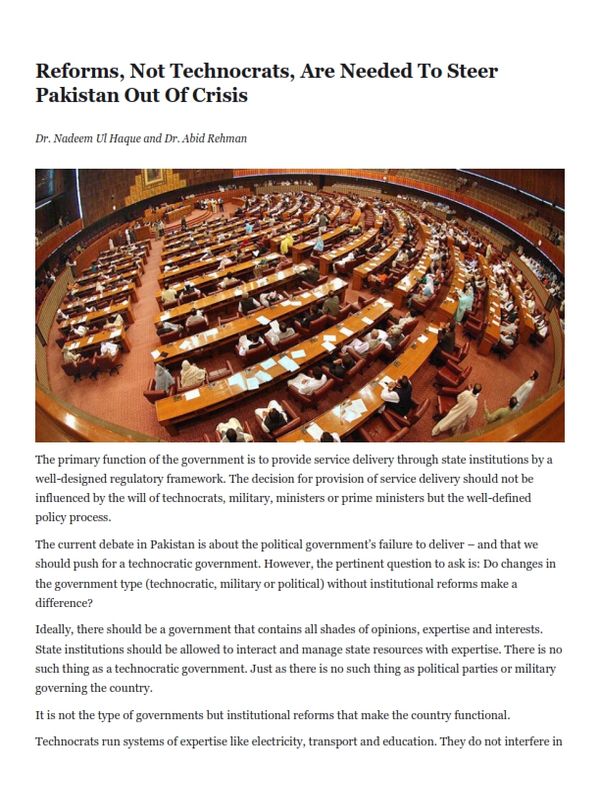Reforms, Not Technocrats, Are Needed To Steer Pakistan Out Of Crisis
Changes in the government type – technocratic, military or political – without institutional reforms will not make a difference
The primary function of the government is to provide service delivery through state institutions by a well-designed regulatory framework. The decision for provision of service delivery should not be influenced by the will of technocrats, military, ministers or prime ministers but the well-defined policy process.
The current debate in Pakistan is about the political government’s failure to deliver – and that we should push for a technocratic government. However, the pertinent question to ask is: Do changes in the government type (technocratic, military or political) without institutional reforms make a difference?
Ideally, there should be a government that contains all shades of opinions, expertise and interests. State institutions should be allowed to interact and manage state resources with expertise. There is no such thing as a technocratic government. Just as there is no such thing as political parties or military governing the country.
It is not the type of governments but institutional reforms that make the country functional.
Technocrats run systems of expertise like electricity, transport and education. They do not interfere in the political systems. Similarly, politicians must talk through the parliament, not interfere with technocratic systems. Technocrats must stop aspiring for political power just as politicians must stop trying to take over technocratic positions.
Pakistan needs a new governance structure based on inclusive state institutions and constitutional reforms. We need good leaders who must work hard to repair these complex divides between the technocrats, politicians, army, bureaucracy, and judges in the country. There is a dire need to unite the institutions through reforms so that they work within their domains.
One thing that should be kept in mind is that whenever a technocratic government is set up in a country, most technocrats hired have served in international institutions. This shows why people have a personal interest in coming to power are advocating this type of government. One should also be reminded that intentions of imported technocrats are questionable. Political governments in democracies are vehicles for representing popular will. However, popular will is limited and evolving and may not be able to produce an efficient outcome. The notion that a vote gives absolute power to do as you like and that votes can be bought through fiscal expenditures and subsidies must be outlawed.
Political power is sweet and absolute. It is derived from a massive amount of invisible perks from taxpayer’s money and ability to dispense favors, which is the abuse of budget. So, the budget must be protected from misuse through constitutional reforms, as an absolute rule is inimical to the democracy and constitution.
Pakistan’s institutional shortcomings and failure of political government pave the way for the military to step in and fill service delivery roles that civilian institutions are unwilling or unable to serve. This dynamic marginalizes civilian institutions and undermines democracy. It means that the types of government structure (technocratic, military or political) results from institutional failure. Therefore, instead of focusing on which type of government can save the country, we must focus on strengthening the state institutions through constitutional reforms.
Pakistan needs a new governance structure based on inclusive state institutions and constitutional reforms. We need good leaders who must work hard to repair these complex divides between the technocrats, politicians, army, bureaucracy, and judges in the country. There is a dire need to unite the institutions through reforms so that they work within their domains. Then we will have democracy.
Further, there should be a policy process. Everything should go through it rather than talking about outdated projects and currying favor of voters through expensive subsidies and giveaways. In sum, Pakistan may come out of the current crisis not through a different form of government but by changing the basic setup of state institutions through constitutional reforms.




